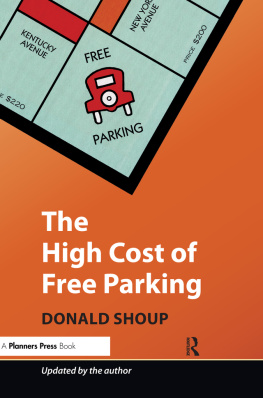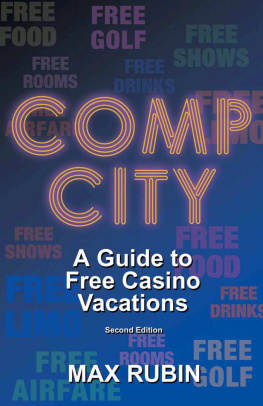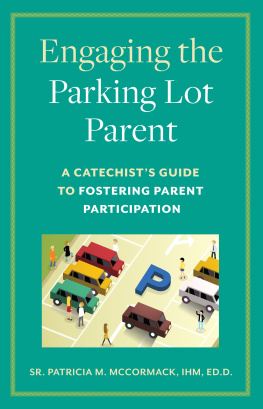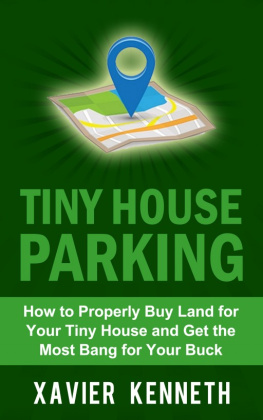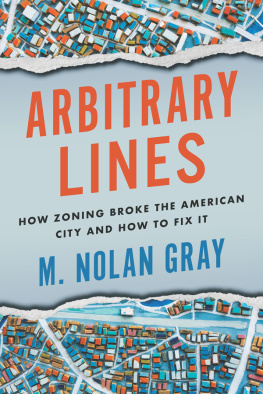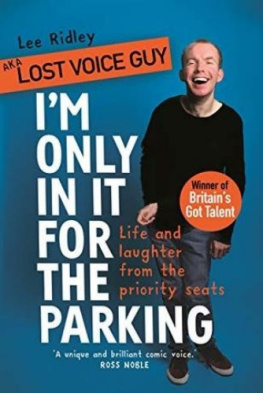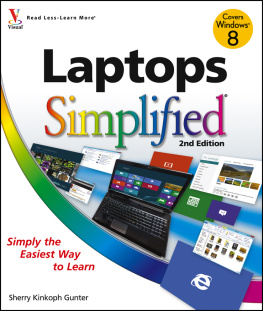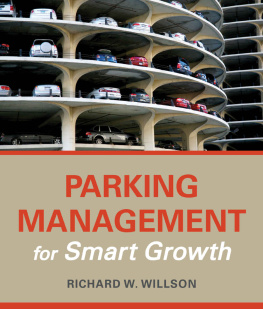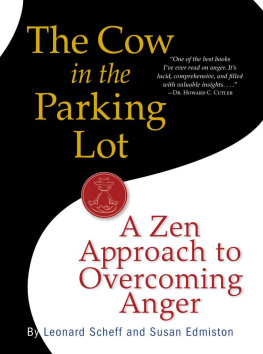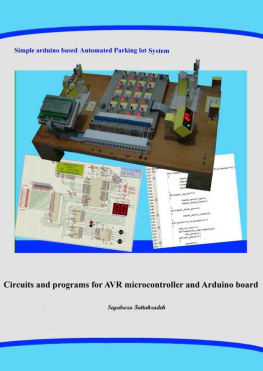Praise for Donald Shoup and the hardcover edition of The High Cost of Free Parking
"Donald Shoup is a professor of urban planning at the University of California, Los Angeles, whose work on the pricing of parking spaces and whether more spaces are good for cities has led to a revolution in ideas about relieving congestion."
New York Times
"This is an extraordinary book. An appropriate descriptive subtitle would be 'Everything you really wanted to know about parking but were afraid to ask!'"
Journal of Urban Design
"A landmark in the annals of urban planning. This important book deserves a prominent spot on any planner's bookshelf. It's brilliant."
Robert Cervero, Professor of City and Regional Planning, University of California, Berkeley
"Imagine an entire book on the length and breadth of parking by an author as facile as James Michener with the insight of Jane Jacobs and the passion of Lewis Mumford and you have Donald Shoup on the subject of parking. This book is destined to become a planning classic."
Martin wachs, FAICP, Professor Emeritus of City and Regional Planning and Civil and Environmental Engineering, University of California, Berkeley
"Parking rock star"
Wall Sreet Journal
"Urban planners and economists should be embarrassed about how little thought we have given to off-street parking requirements. Shoup shows how parking standards have fundamentally shaped our built environment, usually for the worse."
Jos A. Gmez-Ibez, Derek C. Bok Professor of Urban Planning and Public Policy, Harvard University
"The Jane Jacobs of parking policy"
Greater Greater Washington
"This meticulously researched book is a must-read for all policymarkers, community groups, planners, and citizens. Donald Shoup tackles head on the 100-year addiction to car travel and does so with enough humor and wit to hold the hope that a cure could lie ahead."
Anne Vernez Moudon, Professor of Architecture, Urban Design, and Planning, Univesity of Washington
"Godfather of parking reform"
Terrapass
"The Master of parking research"
Gainesville Sun
"Convinced that urbanism can emerge in the backwash of sprawl, Shoup contends that if big boxes, malls and even strip malls were allowed to reduce their parking and replace excess spaces with something more useful, suburbaniltes might embark on the greatest land reclamation scheme this side of the Netherlands. He envisions a partment buildings and townhouses spourting on the edges of mall parking lots and thereby creating nearly fully formed neighborhoods in place of vacant asphalt."
In Transition
"Shoup engages with his deceptively weighty topic in a clear and progressive manner accessible to anyone from amateur parking enthusiasts to planning professionals."
Planning Theory and Practice
" [Shoup] provides a wealth of resources, information, and ammunition for this seeking to change parking regulation, plannning, and design paradigms."
Journal of Panning Literature
"Shoup's accomplishment in this book is impressive. He brings to light an often- dismissed topic Parking that has enormous impact on the urban form. I can't think of any other topic in all my reading about urban areas that has been so ignored and yet has such a demostrated potential for imporving urban life."
Books Notes
"Parking god"
LAist
"The hands-down favorite for Top Books status, The High Cost of Free Parking , despite its epic length, undoubtedly deserves high praise. Donald Shoup, FAICP, an urban planning professor at UCLA, presents a tour de force on free parking, a dubious fact of city life planners have taken for granted for years, and which Shoup has studied for decades."
Planetizen
"This book should be required reading for any- one who cares about this nation's cities. Shoup helps us understand how we can use the billions we are spending to store motor vehicles in ways that can solve our parking problems and build healthy communities."
Micheal S. Dukakis, former Governer of Massachusetts; Distinguished Professor of Political Science, Northeastern University
The High Cost of Free Parking
By
Donald C. Shoup
To Pat
First published 2011 by the American Planning Association
Published 2017 by Routledge
2 Park Square, Milton Park, Abingdon, Oxon OX14 4RN
711 Third Avenue, New York, NY 10017, USA
Routledge is an imprint of the Taylor & Francis Group, an informa business
Copyright 2011 Taylor & Francis
All rights reserved. No part of this book may be reprinted or reproduced or utilised in any form or by any electronic, mechanical, or other means, now known or hereafter invented, including photocopying and recording, or in any information storage or retrieval system, without permission in writing from the publishers.
Notice:
Product or corporate names may be trademarks or registered trademarks, and are used only for identification and explanation without intent to infringe.
ISBN: 978-1-932-36496-5 (pbk)
Library of Congress Control Number 2004 107550 (cloth) 2010919604 (pbk.)
Originally published in hardcover in 2005
Cover image: Monopoly and 2011 Hasbro, Inc.
Used with permission.
10 9 8 7
Contents
Guide
This book has been long in the writing, and I have accumulated many intellectual debts. First, I want to thank my wife Pat, who is the best editor a husband ever had. She has read and reread all the many versions of the manuscript, and contributed many ideas as well as unfailing encouragement. And these are the least of her contributions to my life.
I am also indebted to the Ph.D. students I have worked with at UCLA. Don Pickrell and Richard Willson both wrote their dissertations on employer-paid parking, and I gratefully acknowledge all they have taught me. Mary Jane Breinholt, Jeffrey Brown, Daniel Chatman, Gregg Doyle, Daniel Hess, Hiro Iseki, Eugene Kim, David King, Jianling Lee, Lewison Lem, Michael Manville, William Pitkin, Lisa Schweitzer, and Paul Sorensen have read all or parts of the book manuscript with keenly critical eyes and have made many important contributions.
I also want to thank many colleagues who have commented on the manuscript and given valuable advice. I have learned much from Daniel Benson, Kiran Bhatt, Leland Burns, Robert Cervero, Randall Crane, Elizabeth Deakin, Renee Fortier, William Francis, Jos Gmez-Ibez, Peter Gordon, Genevieve Giuliano, Paul Helmle, Thomas Higgins, Stanley Hoffman, Robin Liggett, Anastasia Loukaitou-Sideris, Frank Mittelbach, Joseph Morton, Vinit Mukija, John Pucher, Nicholas Pyle, Margaret Richardson, Frank Shoup, Richard Steinman, Mark Stocki, Peter Valk, Martin Wachs, Melvin Webber, and Joel Woodhull.
The California Air Resources Board, Lincoln Institute of Land Policy, University of California Transportation Center, United States Department of Transportation, and United States Environmental Protection Agency provided invaluable funding for my research on parking. I confess, however, that I may sometimes have used their funds in ways they did not intend. New planning students arrive at UCLA every year and most of them are required to take my course on Public Research Allocation. Invariably, some of them are superb writers, and their essays are a pleasure to read. I have used much of my research funding to hire these accomplished writers as editors of my manuscript, which has taken many years to straighten out. If you find anything easy to understand in this book, you can thank, as I do, Ellison Alegre, Heather Barnett, Aaron Bernardin, Matthew Benjamin, Jennifer Bruno, Eric Carlson, Joy Chen, Francisco Contreras, T. H. Culhane, Daniel Dermitzel, Amy Ford, Simon Fraser, Jeanne Gilbert, Kay Gilbert, Leslie Goldenberg, Mark Hansen, Tania Hayes, Susan Herre, Kathleen Hiyaki, Kevin Holliday, Mimi Holt, Jeffrey Jones, Douglas Kolozsvari, Danny Krouk, Cheol-ho Lee, Trent Lethco, Christopher Lock, Bravishwar Mallavarapu, Douglas Miller, Andrew Mondschein, Eric Morris, Jeremy Nelson, Todd Nelson, Virginia Parks, Thomas Rice, Rafael Ruiz, Michael Sabel, Yuji Sakaguchi, Charles Sciammas, Gian-Claudia Sciara, Alexander Smith, Manuel Soto, Seth Stark, Florian Urban, Joseph Vardner, Kylee Williams, and Matthew Zisman. Easy reading is hard writing, and my student editors have spent many hours helping me say what I mean. It has been a joy to work with them, and I hope they have learned as much from me as I have from them.

